Charles E W Bean, Diaries, AWM38 3DRL 606/244/1 - 1916 - 1933 - Part 6
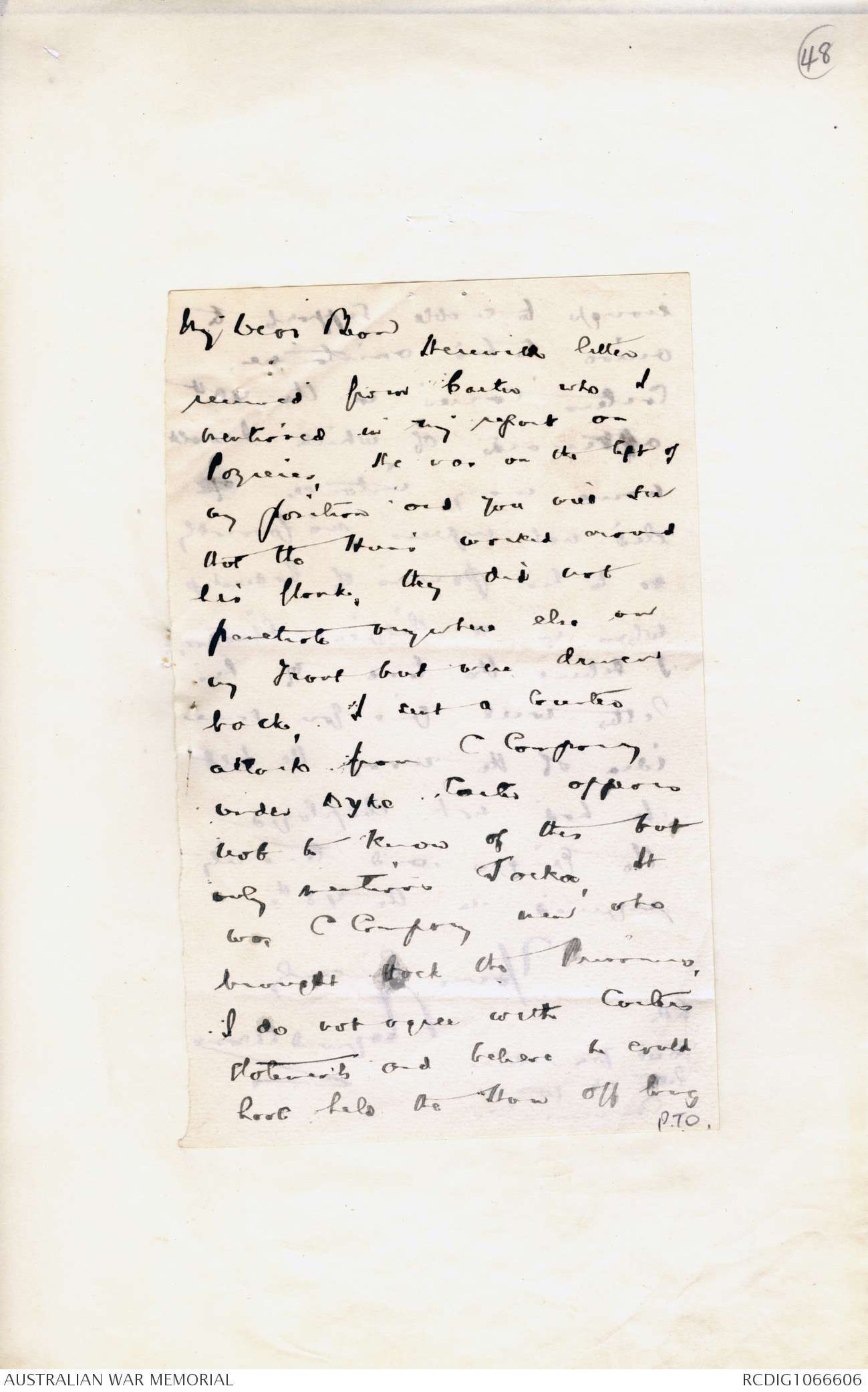
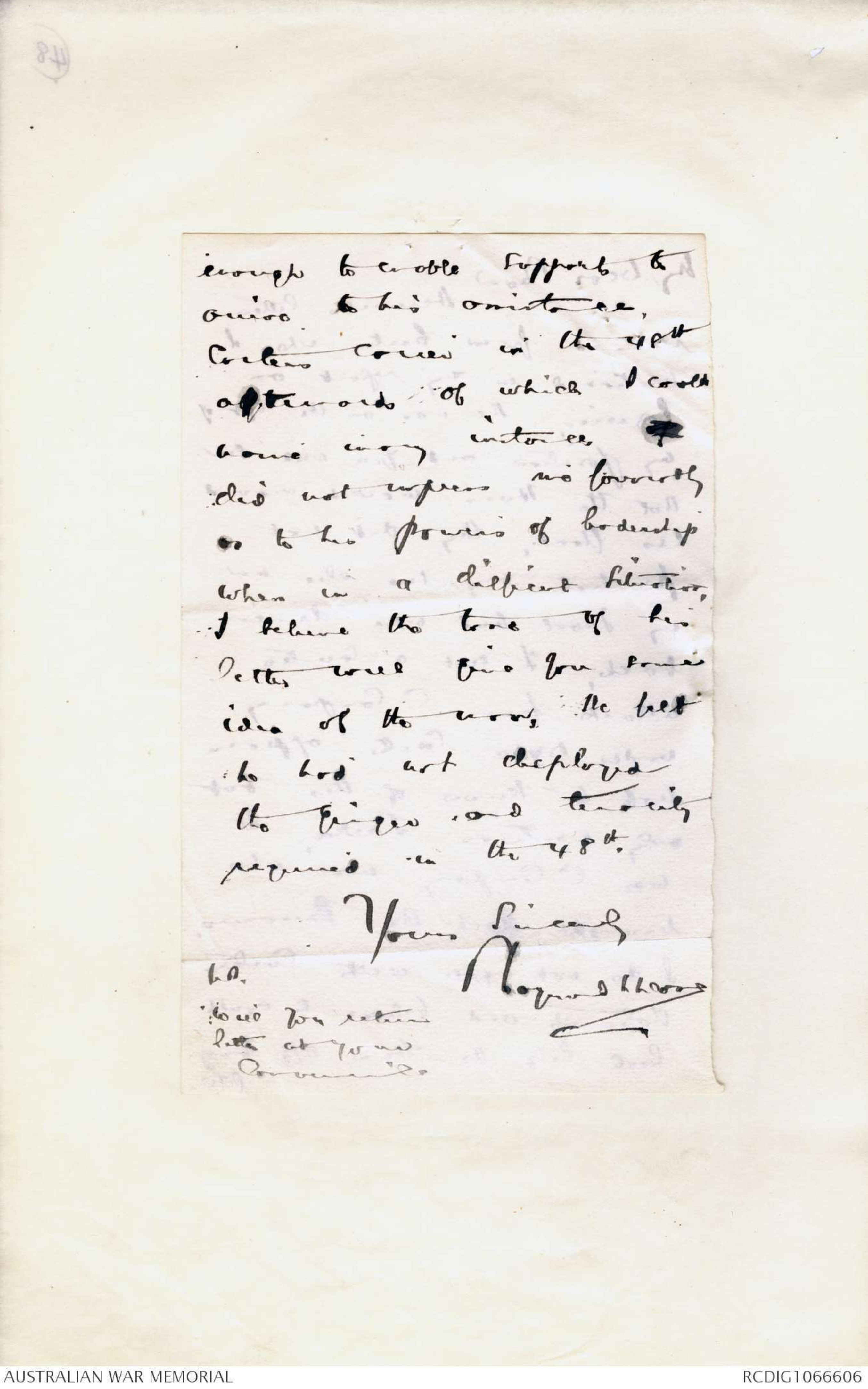
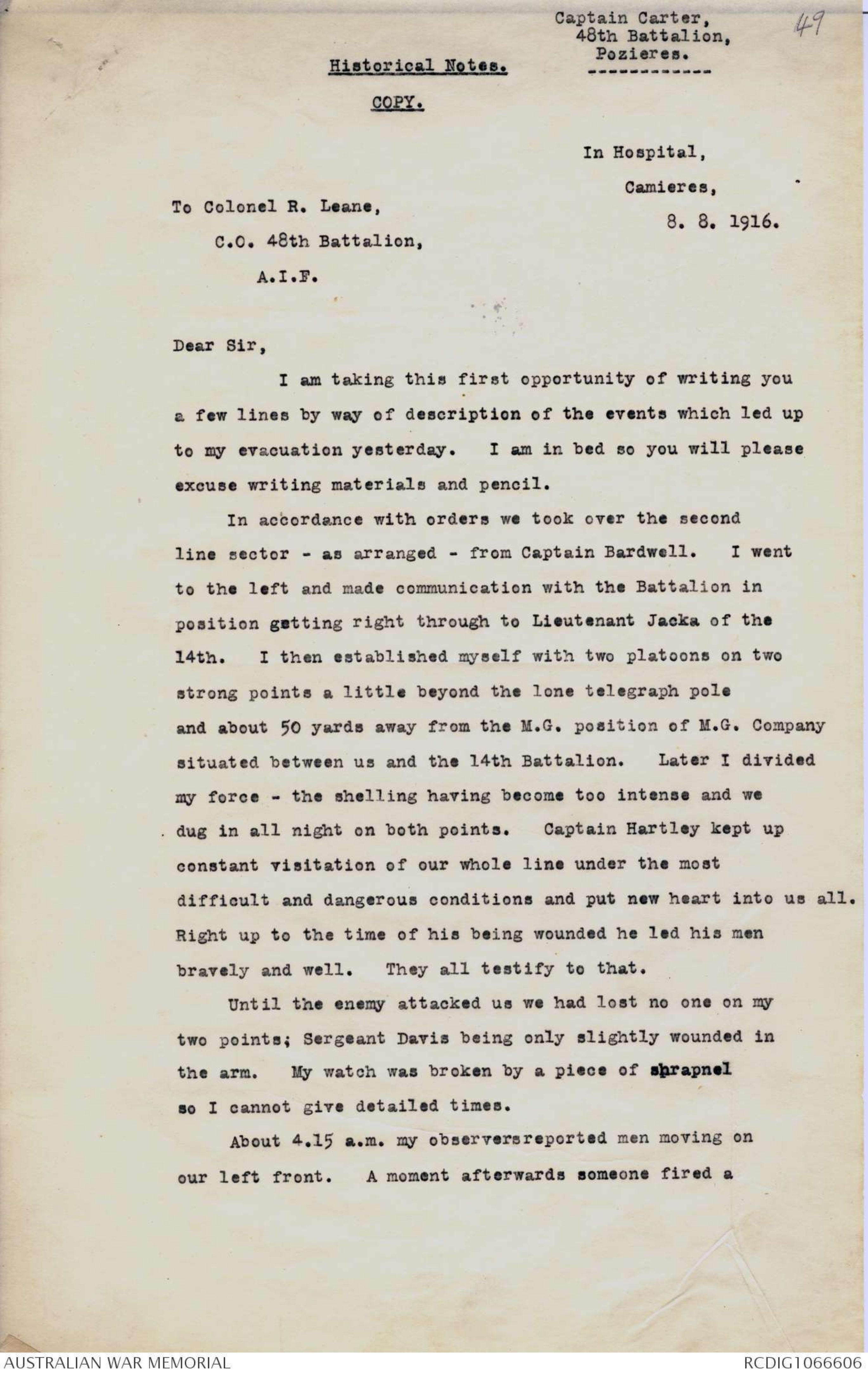
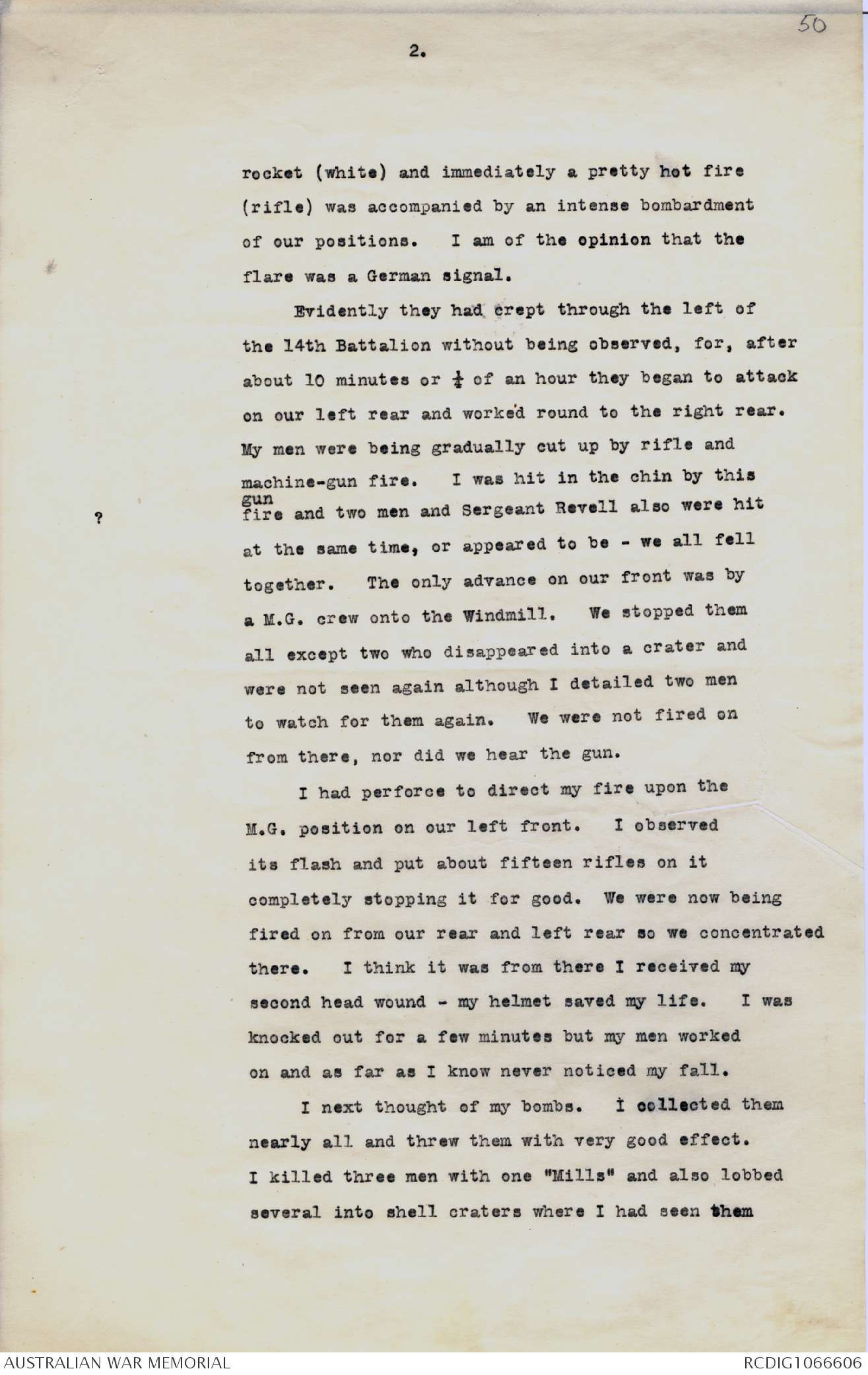
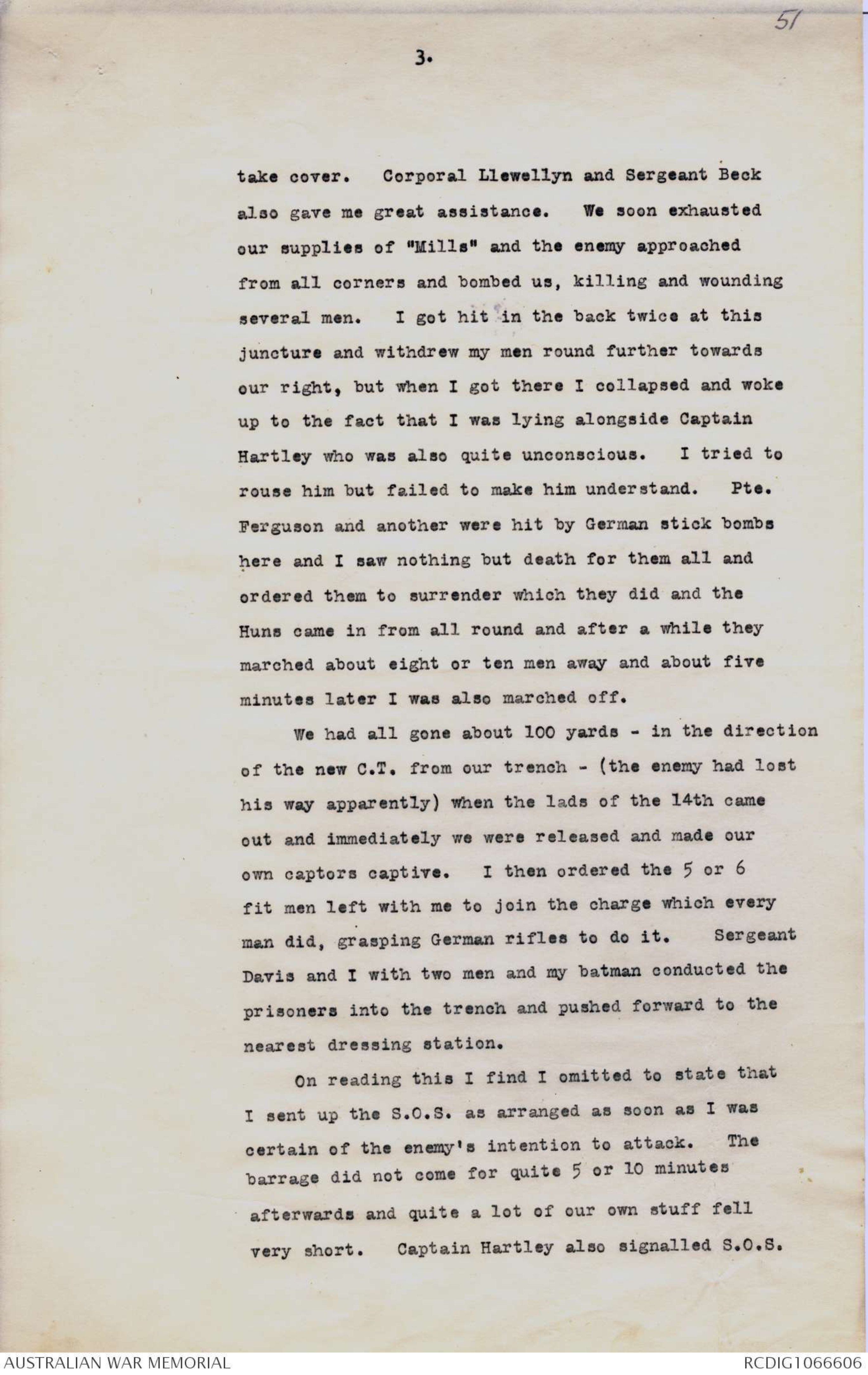
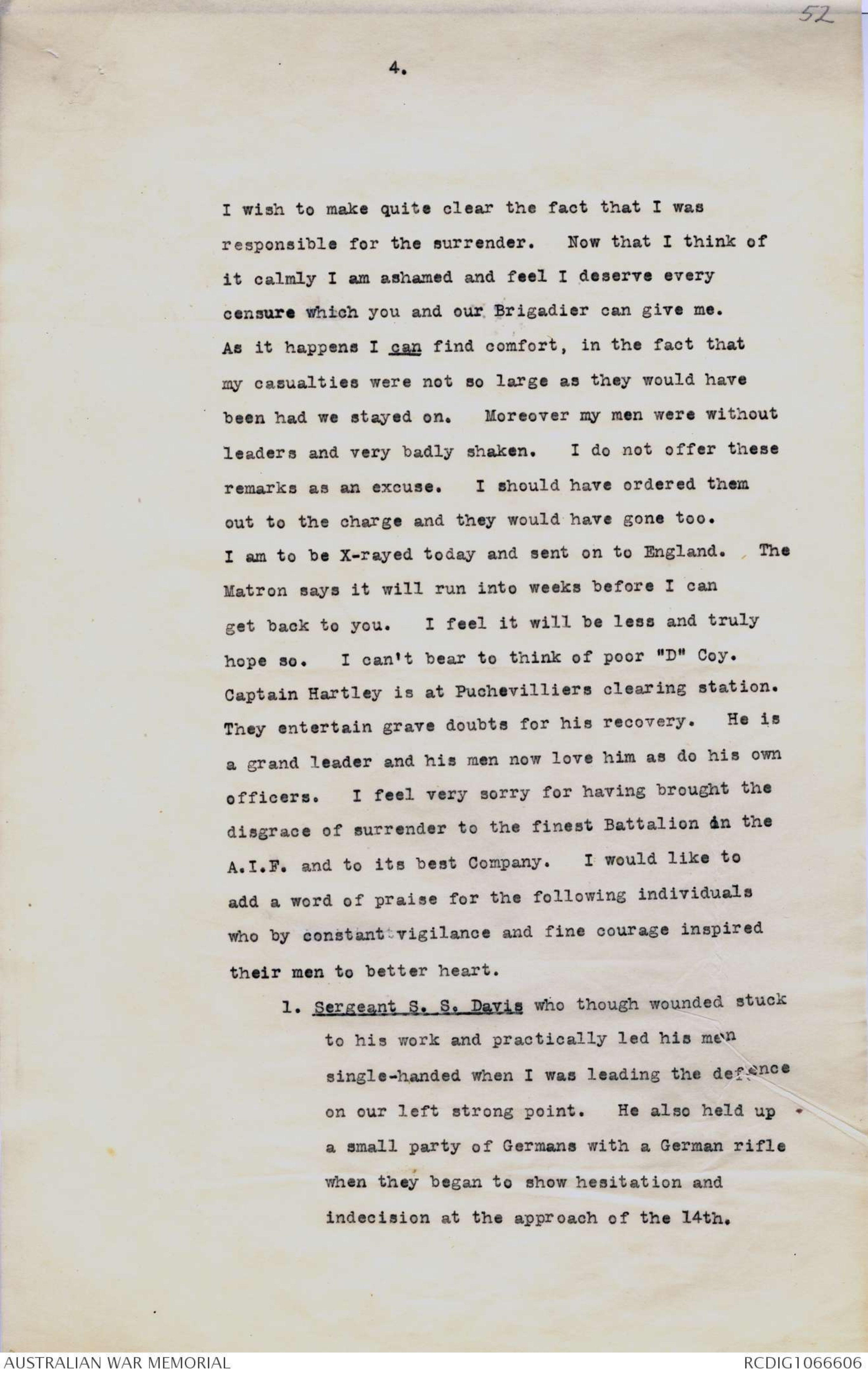
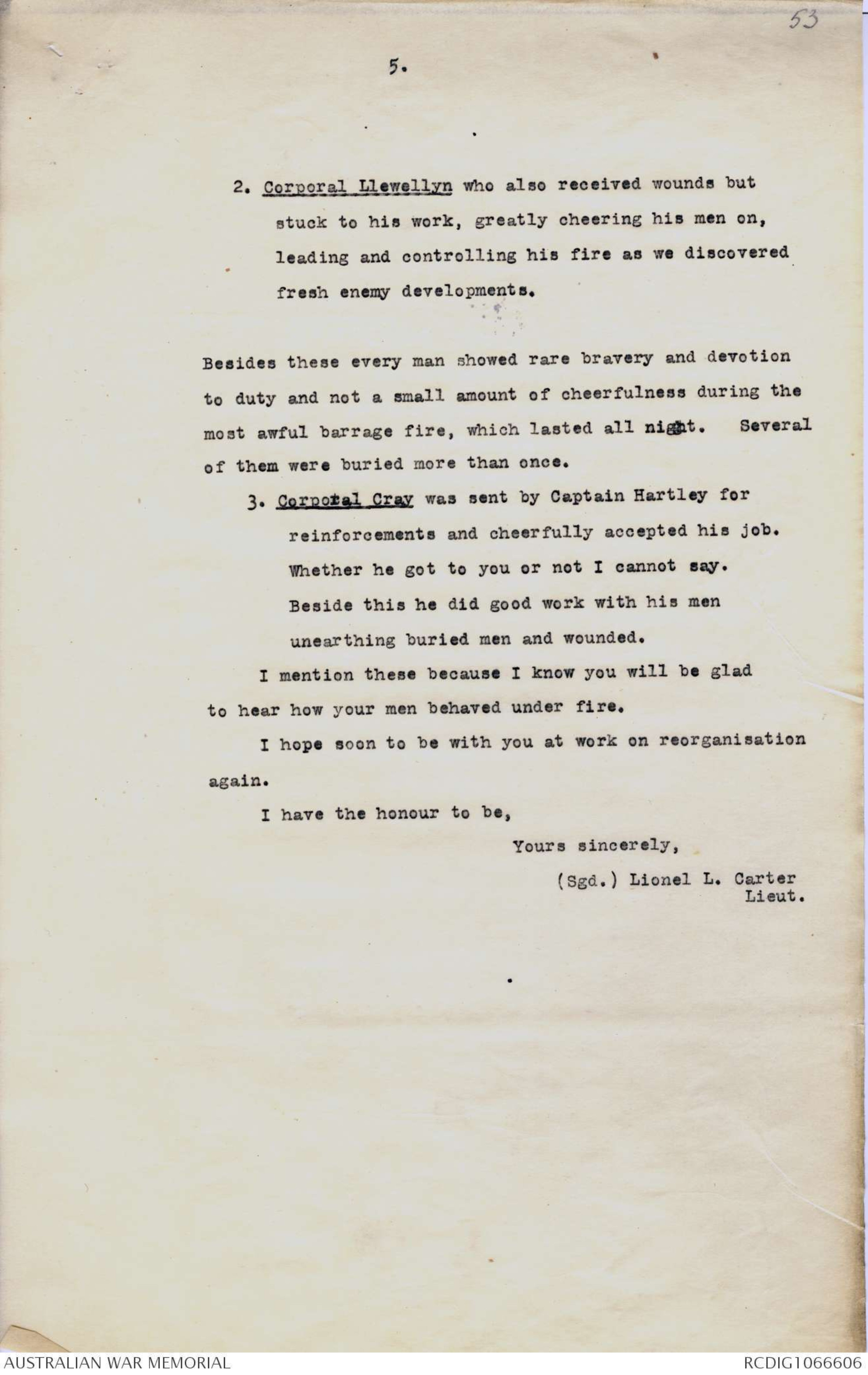
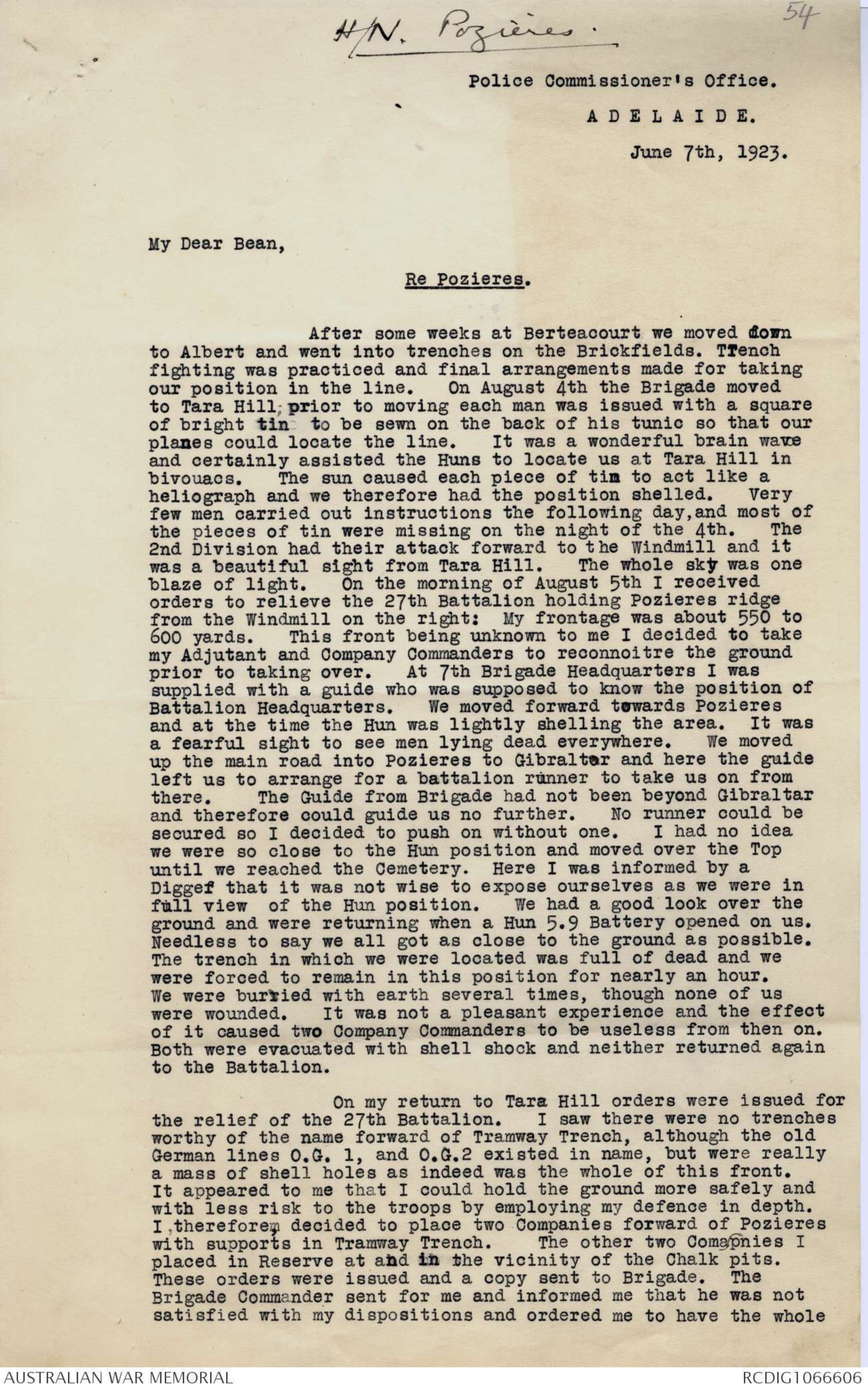
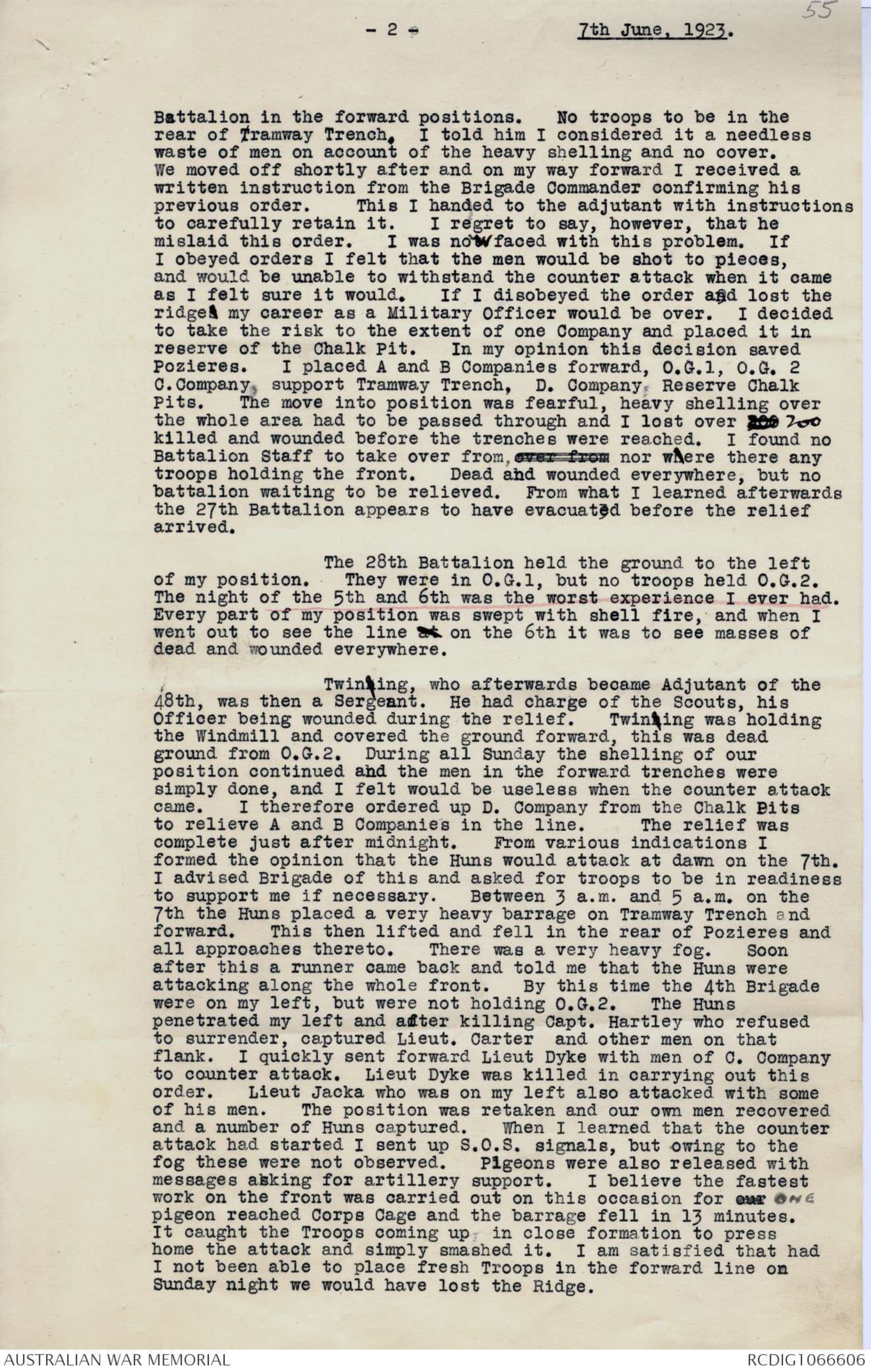
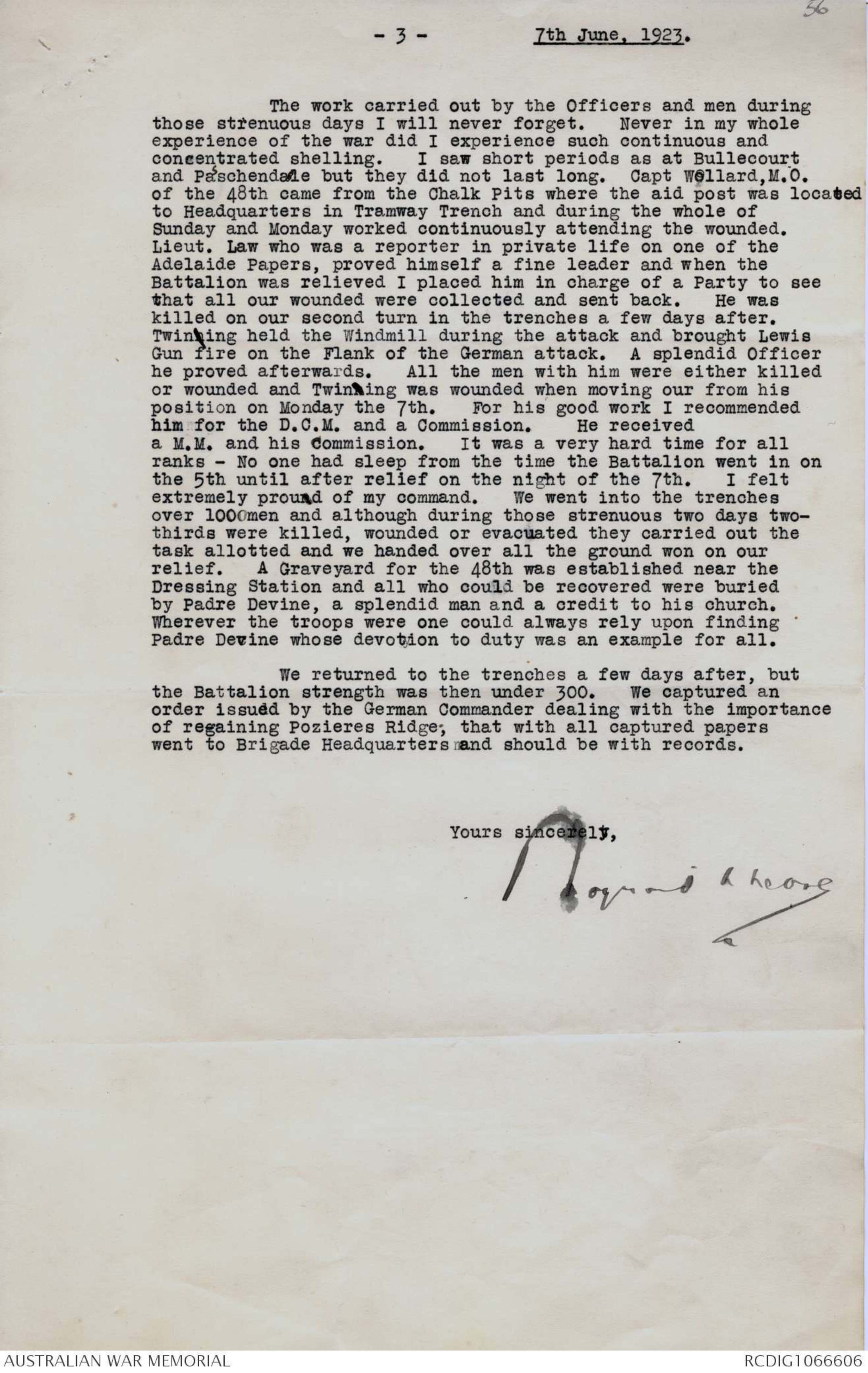
48
My dear Bean
Herewith letter
received from Carter who I
mentioned in my report on
Pozieries. He was on the left of
my position and you will see
that the Huns' worked around
his flank, they did not
penetrate anywhere else on
my front but were driven
back. I sent a Counter
attack from C Company
under Dyke. Carter appears
not to know of this but
only mentions Jacka. It
was C Company men who
brought back the Prisoners.
I do not agree with Carters
statements and believe he could
have held the show off long
P.T.O.
enough to enable supports to
arrive to his assistance.
Carters career in the 48th
afterwards of which I could
name many instances xx
did not impress me favourably
as to his powers of leadership
when in a difficult situation.
I believe the tone of his
letter will give you some
idea of the man. The best
he had not displayed
the ginger and tenacity
required in the 48th.
Yours Sincerely
Raymond L Leane
P.S.
could you return
letter at your
convenience.
49
Captain Carter,
48th Battalion,
Pozieres.
Historical Notes.
COPY.
In Hospital,
Camieres,
8. 8. 1916.
To Colonel R. Leane,
C.O. 48th Battalion,
A.I.F.
Dear Sir,
I am taking this first opportunity of writing you
a few lines by way of description of the events which led up
to my evacuation yesterday. I am in bed so you will please
excuse writing materials and pencil.
In accordance with orders we took over the second
line sector - as arranged - from Captain Bardwell. I went
to the left and made communication with the Battalion in
position getting right through to Lieutenant Jacka of the
14th. I then established myself with two platoons on two
strong points a little beyond the lone telegraph pole
and about 50 yards away from the M.G. position of M.G. Company
situated between us and the 14th Battalion. Later I divided
my force - the shelling having become too intense and we
dug in all night on both points. Captain Hartley kept up
constant visitation of our whole line under the most
difficult and dangerous conditions and put new heart into us all.
Right up to the time of his being wounded he led his men
bravely and well. They all testify to that.
Until the enemy attacked us we had lost no one on my
two points; Sergeant Davis being only slightly wounded in
the arm. My watch was broken by a piece of shrapnel
so I cannot give detailed times.
About 4.15 a.m. my observers reported men moving on
our left front. A moment afterwards someone fired a
50
2.
rocket (white) and immediately a pretty hot fire
(rifle) was accompanied by an intense bombardment
of our positions. I am of the opinion that the
flare was a German signal.
Evidently they had crept through the left of
the 14th Battalion without being observed, for, after
about 10 minutes or ¼ of an hour they began to attack
on our left rear and worked round to the right rear.
My men were being gradually cut up by rifle and
machine-gun fire. I was hit in the chin by this
[*?*] gun fire and two men and Sergeant Revell also were hit
at the same time, or appeared to be - we all fell
together. The only advance on our front was by
a M.G. crew onto the Windmill. We stopped them
all except two who disappeared into a crater and
were not seen again although I detailed two men
to watch for them again. We were not fired on
from there, nor did we hear the gun.
I had perforce to direct my fire upon the
M.G. position on our left front. I observed
its flash and put about fifteen rifles on it
completely stopping it for good. We were now being
fired on from our rear and left rear so we concentrated
there. I think it was from there I received my
second head wound - my helmet saved my life. I was
knocked out for a few minutes but my men worked
on and as far as I know never noticed my fall.
I next thought of my bombs. I collected them
nearly all and threw them with very good effect.
I killed three men with one "Mills" and also lobbed
several into shell craters where I had seen them
51
3.
take cover. Corporal Llewellyn and Sergeant Beck
also gave me great assistance. We soon exhausted
our supplies of "Mills" and the enemy approached
from all corners and bombed us, killing and wounding
several men. I got hit in the back twice at this
juncture and withdrew my men round further towards
our right, but when I got there I collapsed and woke
up to the fact that I was lying alongside Captain
Hartley who was also quite unconscious. I tried to
rouse him but failed to make him understand. Pte.
Ferguson and another were hit by German stick bombs
here and I saw nothing but death for them all and
ordered them to surrender which they did and the
Huns came in from all round and after a while they
marched about eight or ten men away and about five
minutes later I was also marched off.
We had all gone about 100 yards - in the direction
of the new C.T. from our trench - (the enemy had lost
his way apparently) when the lads of the 14th came
out and immediately we were released and made our
own captors captive. I then ordered the 5 or 6
fit men left with me to join the charge which every
man did, grasping German rifles to do it. Sergeant
Davis and I with two men and my batman conducted the
prisoners into the trench and pushed forward to the
nearest dressing station.
On reading this I find I omitted to state that
I sent up the S.O.S. as arranged as soon as I was
certain of the enemy's intention to attack. The
barrage did not come for quite 5 or 10 minutes
afterwards and quite a lot of our own stuff fell
very short. Captain Hartley also signalled S.O.S.
52
4.
I wish to make quite clear the fact that I was
responsible for the surrender. Now that I think of
it calmly I am ashamed and feel I deserve every
censure which you and our Brigadier can give me.
As it happens I can find comfort, in the fact that
my casualties were not so large as they would have
been had we stayed on. Moreover my men were without
leaders and very badly shaken. I do not offer these
remarks as an excuse. I should have ordered them
out to the charge and they would have gone too.
I am to be X-rayed today and sent on to England. The
Matron says it will run into weeks before I can
get back to you. I feel it will be less and truly
hope so. I can't bear to think of poor "D" Coy.
Captain Hartley is at Puchevilliers clearing station.
They entertain grave doubts for his recovery. He is
a grand leader and his men now love him as do his own
officers. I feel very sorry for having brought the
disgrace of surrender to the finest Battalion in the
A.I.F. and to its best Company. I would like to
add a word of praise for the following individuals
who by constant vigilance and fine courage inspired
their men to better heart.
1. Sergeant S. S. Davis who though wounded stuck
to his work and practically led his men
single-handed when I was leading the defence
on our left strong point. He also held up
a small party of Germans with a German rifle
when they began to show hesitation and
indecision at the approach of the 14th.
53
5.
2. Corporal Llewellyn who also received wounds but
stuck to his work, greatly cheering his men on,
leading and controlling his fire as we discovered
fresh enemy developments.
Besides these every man showed rare bravery and devotion
to duty and not a small amount of cheerfulness during the
most awful barrage fire, which lasted all night. Several
of them were buried more than once.
3. Corporal Cray was sent by Captain Hartley for
reinforcements and cheerfully accepted his job.
Whether he got to you or not I cannot say.
Beside this he did good work with his men
unearthing buried men and wounded.
I mention these because I know you will be glad
to hear how your men behaved under fire.
I hope soon to be with you at work on reorganisation
again.
I have the honour to be,
Yours sincerely,
(Sgd.) Lionel L. Carter
Lieut.
54
H/N. Pozieres.
Police Commissioner's Office.
ADELAIDE.
June 7th, 1923.
My Dear Bean,
Re Pozieres.
After some weeks at Berteacourt we moved down
to Albert and went into trenches on the Brickfields. Trench
fighting was practiced and final arrangements made for taking
our position in the line. On August 4th the Brigade moved
to Tara Hill; prior to moving each man was issued with a square
of bright tin to be sewn on the back of his tunic so that our
planes could locate the line. It was a wonderful brain wave
and certainly assisted the Huns to locate us at Tara Hill in
bivouacs. The sun caused each piece of tin to act like a
heliograph and we therefore had the position shelled. Very
few men carried out instructions the following day, and most of
the pieces of tin were missing on the night of the 4th. The
2nd Division had their attack forward to the Windmill and it
was a beautiful sight from Tara Hill. The whole sky was one
blaze of light. On the morning of August 5th I received
orders to relieve the 27th Battalion holding Pozieres ridge
from the Windmill on the right: My frontage was about 550 to
600 yards. This front being unknown to me I decided to take
my Adjutant and Company Commanders to reconnoitre the ground
prior to taking over. At 7th Brigade Headquarters I was
supplied with a guide who was supposed to know the position of
Battalion Headquarters. We moved forward towards Pozieres
and at the time the Hun was lightly shelling the area. It was
a fearful sight to see men lying dead everywhere. We moved
up the main road into Pozieres to Gibraltar and here the guide
left us to arrange for a battalion runner to take us on from
there. The Guide from Brigade had not been beyond Gibraltar
and therefore could guide us no further. No runner could be
secured so I decided to push on without one. I had no idea
we were so close to the Hun position and moved over the Top
until we reached the Cemetery. Here I was informed by a
Digger that it was not wise to expose ourselves as we were in
full view of the Hun position. We had a good look over the
ground and were returning when a Hun 5.9 Battery opened on us.
Needless to say we all got as close to the ground as possible.
The trench in which we were located was full of dead and we
were forced to remain in this position for nearly an hour.
We were burried with earth several times, though none of us
were wounded. It was not a pleasant experience and the effect
of it caused two Company Commanders to be useless from then on.
Both were evacuated with shell shock and neither returned again
to the Battalion.
On my return to Tara Hill orders were issued for
the relief of the 27th Battalion. I saw there were no trenches
worthy of the name forward of Tramway Trench, although the old
German lines O.G. 1, and O.G.2 existed in name, but were really
a mass of shell holes as indeed was the whole of this front.
It appeared to me that I could hold the ground more safely and
with less risk to the troops by employing my defence in depth.
I, therefore, decided to place two Companies forward of Pozieres
with supports in Tramway Trench. The other two Comapnies I
placed in Reserve at and in the vicinity of the Chalk pits.
These orders were issued and a copy sent to Brigade. The
Brigade Commander sent for me and informed me that he was not
satisfied with my dispositions and ordered me to have the whole
55
- 2 -
7th June, 1923.
Battalion in the forward positions. No troops to be in the
rear of Tramway Trench. I told him I considered it a needless
waste of men on account of the heavy shelling and no cover.
We moved off shortly after and on my way forward I received a
written instruction from the Brigade Commander confirming his
previous order. This I handed to the adjutant with instructions
to carefully retain it. I regret to say, however, that he
mislaid this order. I was now faced with this problem. If
I obeyed orders I felt that the men would be shot to pieces,
and would be unable to withstand the counter attack when it came
as I felt sure it would. If I disobeyed the order and lost the
ridges my career as a Military Officer would be over. I decided
to take the risk to the extent of one Company and placed it in
reserve of the Chalk Pit. In my opinion this decision saved
Pozieres. I placed A and B Companies forward, O.G.1, 0.G. 2
C. Company, support Tramway Trench, D. Company, Reserve Chalk
Pits. The move into position was fearful, heavy shelling over
the whole area had to be passed through and I lost over 300 200
killed and wounded before the trenches were reached. I found no
Battalion Staff to take over from, over from nor where there any
troops holding the front. Dead and wounded everywhere, but no
battalion waiting to be relieved. From what I learned afterwards
the 27th Battalion appears to have evacuat3ed before the relief
arrived.
The 28th Battalion held the ground to the left
of my position. They were in O.G.1, but no troops held O.G.2.
The night of the 5th and 6th was the worst experience I ever had.
Every part of my position was swept with shell fire, and when I
went out to see the line at on the 6th it was to see masses of
dead and wounded everywhere.
Twinning, who afterwards became Adjutant of the
48th, was then a Sergeant. He had charge of the Scouts, his
Officer being wounded during the relief. Twinning was holding
the Windmill and covered the ground forward, this was dead
ground from O.G.2. During all Sunday the shelling of our
position continued and the men in the forward trenches were
simply done, and I felt would be useless when the counter attack
came. I therefore ordered up D. Company from the Chalk Pits
to relieve A and B Companies in the line. The relief was
complete just after midnight. From various indications I
formed the opinion that the Huns would attack at dawn on the 7th.
I advised Brigade of this and asked for troops to be in readiness
to support me if necessary. Between 3 a.m. and 5 a.m. on the
7th the Huns placed a very heavy barrage on Tramway Trench and
forward. This then lifted and fell in the rear of Pozieres and
all approaches thereto. There was a very heavy fog. Soon
after this a runner came back and told me that the Huns were
attacking along the whole front. By this time the 4th Brigade
were on my left, but were not holding O.G.2. The Huns
penetrated my left and after killing Capt. Hartley who refused
to surrender, captured Lieut. Carter and other men on that
flank. I quickly sent forward Lieut Dyke with men of C. Company
to counter attack. Lieut Dyke was killed in carrying out this
order. Lieut Jacka who was on my left also attacked with some
of his men. The position was retaken and our own men recovered
and a number of Huns captured. When I learned that the counter
attack had started I sent up S.O.S. signals, but owing to the
fog these were not observed. Pigeons were also released with
messages asking for artillery support. I believe the fastest
work on the front was carried out on this occasion for our one
pigeon reached Corps Cage and the barrage fell in 13 minutes.
It caught the Troops coming up, in close formation to press
home the attack and simply smashed it. I am satisfied that had
I not been able to place fresh Troops in the forward line on
Sunday night we would have lost the Ridge.
56
- 3 -
7th June, 1923.
The work carried out by the Officers and men during
those strenuous days I will never forget. Never in my whole
experience of the war did I experience such continuous and
concentrated shelling. I saw short periods as at Bullecourt
and Passchendale but they did not last long. Capt Wollard, M.O.
of the 48th came from the Chalk Pits where the aid post was located
to Headquarters in Tramway Trench and during the whole of
Sunday and Monday worked continuously attending the wounded.
Lieut. Law who was a reporter in private life on one of the
Adelaide Papers, proved himself a fine leader and when the
Battalion was relieved I placed him in charge of a Party to see
that all our wounded were collected and sent back. He was
killed on our second turn in the trenches a few days after.
Twinning held the Windmill during the attack and brought Lewis
Gun fire on the Flank of the German attack. A splendid Officer
he proved afterwards. All the men with him were either killed
or wounded and Twinning was wounded when moving our from his
position on Monday the 7th. For his good work I recommended
him for the D.C.M. and a Commission. He received
a M.M. and his Commission. It was a very hard time for all
ranks - No one had sleep from the time the Battalion went in on
the 5th until after relief on the night of the 7th. I felt
extremely pround of my command. We went into the trenches
over 1000men and although during those strenuous two days
two-thirds were killed, wounded or evacuated they carried out the
task allotted and we handed over all the ground won on our
relief. A Graveyard for the 48th was established near the
Dressing Station and all who could be recovered were buried
by Padre Devine, a splendid man and a credit to his church.
Wherever the troops were one could always rely upon finding
Padre Devine whose devotion to duty was an example for all.
We returned to the trenches a few days after, but
the Battalion strength was then under 300. We captured an
order issued by the German Commander dealing with the importance
of regaining Pozieres Ridge; that with all captured papers
went to Brigade Headquarters and should be with records.
Yours sincerely,
Raymond L Leane
 Deb Parkinson
Deb ParkinsonThis transcription item is now locked to you for editing. To release the lock either Save your changes or Cancel.
This lock will be automatically released after 60 minutes of inactivity.